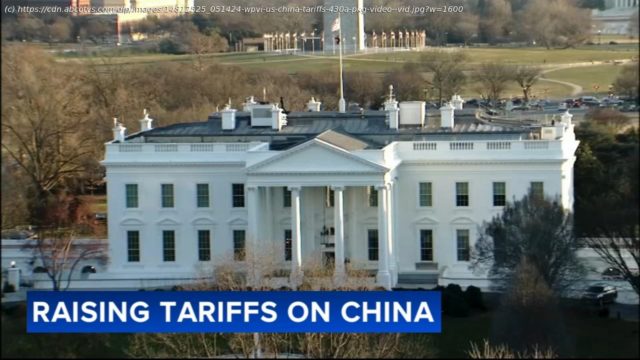Array
The Biden administration announced plans to slap new tariffs on Chinese electric vehicles, advanced batteries, solar cells, steel, aluminum and medical equipment – an election-year move that’s likely to increase friction between the world’s two largest economies.
The tariffs come in the middle of a heated campaign between President Joe Biden and his Republican predecessor, Donald Trump, in which both candidates are vying to show who’s tougher on China.
The tariffs are unlikely to have much of an inflationary impact because of how they’re structured. Administration officials said they think the tariffs won’t escalate tensions with China, yet they expect that China will explore ways to respond to the new taxes on their products. It’s uncertain what the long-term impact on prices could be if the tariffs contribute to a wider trade dispute.
The tariffs are to be phased in over the next three years, with those that take effect in 2024 covering EVs, solar cells, syringes, needles, steel and aluminum and more. There are currently very few EVs from China in the U.S., but officials worry that low-priced models made possible by Chinese government subsidies could soon start flooding the U.S. market.
Chinese firms can sell EVs for as little as $12,000. Their solar cell plants and steel and aluminum mills have enough capacity to meet much of the world’s demand, with Chinese officials arguing that their production keeps prices low and would aid a transition to the green economy.
Lael Brainard, director of the White House National Economic Council, said the tariffs will raise the cost of select Chinese goods and help thwart Beijing’s efforts to dominate the market for emerging technologies in ways that pose risks to U.S. national security and economic stability.
“China is simply too big to play by its own rules,” Brainard told reporters on a Monday call previewing the announcement.
Administration officials have stressed that the decision on tariffs was made independently of November’s presidential election. But Brainard noted in her remarks that the tariffs would help workers in Pennsylvania and Michigan, two of the battleground states that will decide who wins the election.
Under the findings of a four-year review on trade with China, the tax rate on imported Chinese EVs is to rise to 102.5% this year, up from total levels of 27.5%. The review was undertaken under Section 301 of the Trade Act of 1974, which allows the government to retaliate against trade practices deemed unfair or in violation of global standards.
Under the 301 guidelines, the tariff rate is to double to 50% on solar cell imports this year. Tariffs on certain Chinese steel and aluminum products will climb to 25% this year. Computer chip tariffs will double to 50% by 2025.
For lithium-ion EV batteries, tariffs will rise from 7.
Home
United States
USA — China Biden hiking tariffs on Chinese EVs, solar cells, steel, aluminum – adding...






